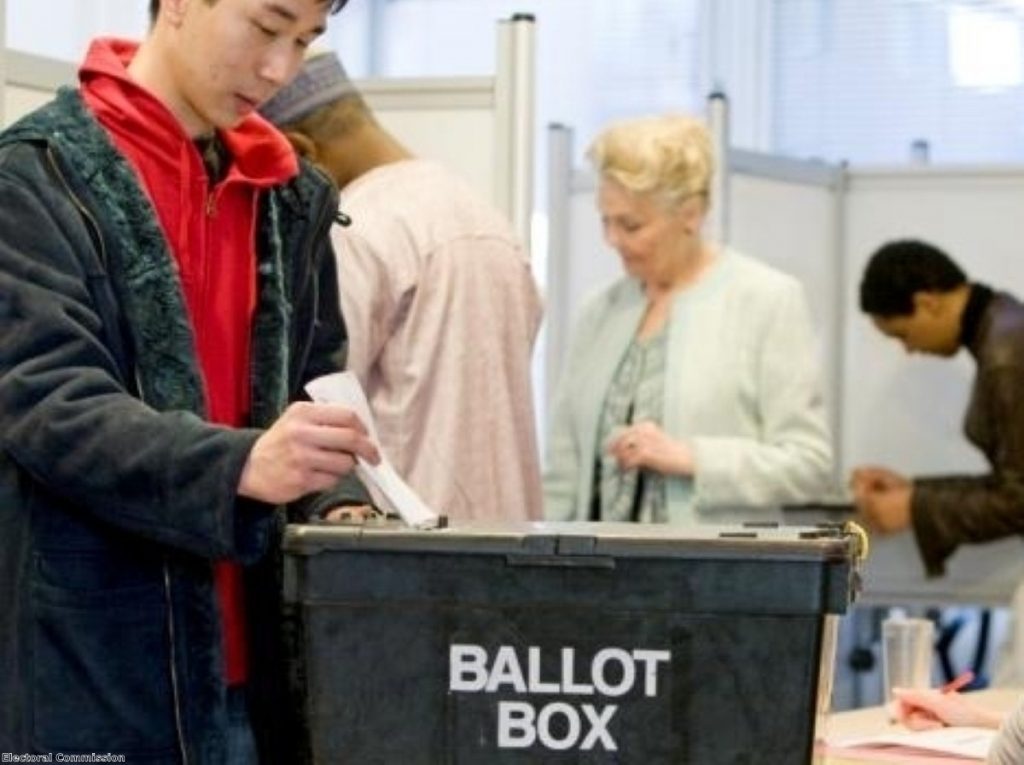Outsourcing voting: How private companies could profit from British elections
Switching to electronic voting poses lucrative opportunities for private companies – and they're now champing at the bit to get involved.
It is, right now, a relatively small market. Only about 20 countries around the world look to the international marketplace to procure electronic systems which will help their elections run smoothly. Most of them have done so out of necessity. Governments facing limited public trust have proved more likely to abandon the laborious – and easily manipulated – paper-based voting methods than those in countries whose system isn't obviously broken. Latin American states have been the most enthusiastic adopters. They've had some success. In Brazil, where the most recent presidential contest saw a gap of just 1.5% between the two main candidates, the results were released by the morning after polling day. And they weren't contested.
In Europe progress has been slower. An Irish attempt turned into a classic IT fiasco. A Dutch effort was quickly hacked, prompting embarrassment and a rapid retreat to paper-only systems. Europe has on the whole been a tricky market because of widespread worries about cybersecurity and privacy issues.
And then, last month, a sudden enthusiasm for making the change suddenly emerged in Britain.


"In the 2020 general election," the Speaker's Commission on Digital Democracy recommended, "secure online voting should be an option for all voters". This was unexpected. The UK, unencumbered by controversy over hanging chads and placing complete trust in the army of teacher-type volunteers who count its votes, had not previously shown much interest in upgrading its election system. Britain is a small-c conservative sort of country. There didn't appear to be much need for a change, so there hadn't been many calls for one.
The Speaker's Commission took a different view. Its focus on finding ways parliament can use the internet to reinvigorate the UK's sluggish democracy had led it to a novel conclusion about electronic voting. "There's a whole layer of people who expect to do everything on their apps, and sooner or later they'll expect to vote online," commissioner Dr Cristina Leston-Bandeira of the University of Hull explained last month to Politics.co.uk. "We have to think in terms of the future. Technology is moving so fast we hope that soon it will be possible for people to vote online and have trust in the system as they do so."
It falls to third-parties to come up with the software which will make this possible. This is where the private companies come in, because setting a 2020 ambition will act as a big incentive for them to come up with an attractive solution. The prospect of a lucrative contract is already attracting attention. And firms are encouraged by the likelihood of cross-party support. Labour, which struggles to get its voters out more than the Conservatives, has already made positive noises. The Conservatives will like the sound of anything which saves taxpayers' money. Electronic voting is expected to cut the cost of running elections by around a third. All that is needed is a company to come forward and offer a viable proposition.
One such firm is SGO, which hired former Foreign Office minister Mark Malloch-Brown as its chairman in November 2014. Lord Malloch-Brown headed the UN's development programme, worked as Kofi Annan's chief of staff and was vice-president at the World Bank. And he thinks the coming general election is only going to help his company's cause.
Row of electronic voting machines – an odd exhibit for a London office (unless you happen to make them) pic.twitter.com/c3DGRNLlXE
— Alex Stevenson (@Alex__Stevenson) February 18, 2015
"It could be a watershed," he says. The controversy over voter registration is undermining confidence in the system. Electoral fraud could raise corruption concerns as a result of "the breakdown of the old homogeneity of mid-20th century UK" in places like Tower Hamlets. Then there are work-life changes which make the physical restriction of voting where you live increasingly inconvenient.
"Take your average modern working couple – one or both of them may be taking the kids to school before going to work, the other stays late at work," Malloch-Brown says. "All those mechanical issues leave you arguing that there is a significant depressing effect of the current technology or lack of it on participation and turnout."
Is he saying chaos in 2015 is going to help his company make money in 2020?
"If any country can manage big set pieces like elections it's the UK. I don't think the election is going to descend into chaos, but it is going to expose the limitations of the current system in a rapidly changing social demographic."

SGO is well-connected and is now headquartered in London, but there will be other companies eyeing the potential opportunity the transition offers. It will be up to individual firms to work out whether to pitch for a rapid switch or to adopt a slower, steadier approach. That could involve an adoption of centralised results software first, followed by electronic voting machines at polling stations, before voting becomes possible over the internet.
This story is likely to move fast. Next year's Scottish parliamentary elections could feature some kind of electronic voting. Pilots in by-elections are likely elsewhere in the UK. "It's one of those changes where you kind of know that 15 years from now, when you look back, we will be doing it," Malloch-Brown says. "It sort of doesn't make sense when we're living the rest of our lives online that we would somehow exclude this."

